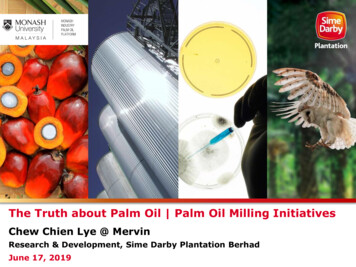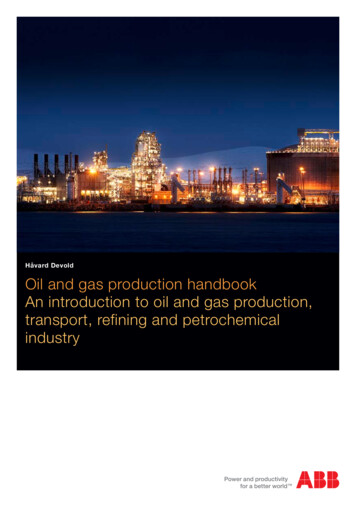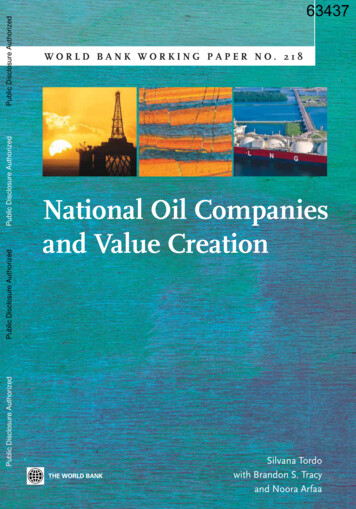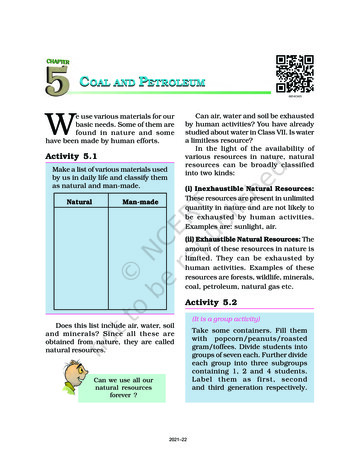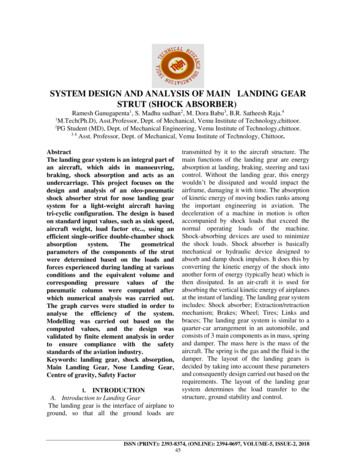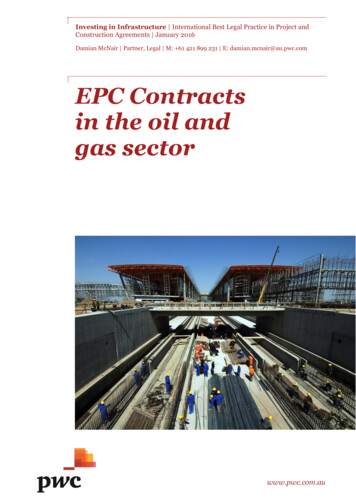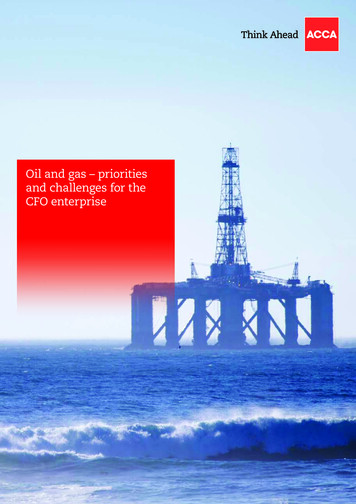
Transcription
Oil and gas – prioritiesand challenges for theCFO enterprise
About ACCAACCA (the Association of Chartered Certified Accountants)is the global body for professional accountants. We aimto offer business-relevant, first-choice qualifications topeople of application, ability and ambition around theworld who seek a rewarding career in accountancy,finance and management.Founded in 1904, ACCA has consistently held uniquecore values: opportunity, diversity, innovation, integrityand accountability. We believe that accountants bringvalue to economies in all stages of development. Weaim to develop capacity in the profession and encouragethe adoption of consistent global standards. Our valuesare aligned to the needs of employers in all sectors andwe ensure that, through our qualifications, we prepareaccountants for business. We work to open up theprofession to people of all backgrounds and removeartificial barriers to entry, ensuring that our qualificationsand their delivery meet the diverse needs of traineeprofessionals and their employers.We support our 170,000 members and 436,000 studentsin 180 countries, helping them to develop successfulcareers in accounting and business, with the skillsrequired by employers. We work through a network of92 offices and centres and more than 8,500 ApprovedEmployers worldwide, who provide high standards ofemployee learning and development. Through ourpublic interest remit, we promote appropriate regulationof accounting and conduct relevant research to ensureaccountancy continues to grow in reputation andinfluence. The Association of Chartered Certified AccountantsJune 2015This report summarisesthe key issues facingfinance professionals inthe oil and gas sector.It considers what theirpriorities might be intheir role of helpingdrive stability andgrowth in the sector.
IntroductionConcerns aboutenvironmental sustainability,shifting demand patterns,increasing risk and achanging supplier landscapecontinue to drive significantchanges in the industry.3Turbulence is nothing particularly new tothe global oil and gas sector. The end ofthe 1970s and the OPEC crisis witnessedsignificant spikes in the relative USD price.What followed was relative calm, withsteady low prices throughout the 1990s.Prices then started to increase in the early2000s, principally owing to demandgrowth in China. After 2005 there were1. ENVIRONMENTAL SUSTAINABILITYThe longer term environmentalsustainability of the oil industry and fossilfuel extraction continues to dominate theagenda, and there is growing scientificevidence on the relationship between theuse of fossil fuels and climate change.With international commitments on globalwarming targets of two degrees, andgrowing interest in cleaner alternativeforms of energy (as well as cleanerextractive processes), how the industryadapts to a greener future remains in thespotlight. Global interest in alternativenon fossil based energy forms, regulatorydisincentives (eg carbon taxes), and morelocalised and greener energy productionactivities will continue to impact the futureof the industry.2. SHIFTING DEMANDIn the Eurozone there are concerns ofdeflation (or at least zero inflation) andother leading economic indicators such asdebt levels and unemployment rates aresignificantly challenging. Elsewhere themajor Asian economies too are notwitnessing the growth levels that theyhave become accustomed to over the last20 years. As economies continue tomature, the relative shift to serviceeconomies from heavy industry has anobvious impact on the demand for fossilfuels. So consumption patterns continueto shift and evolve, with obviousconsequences for global pricing levels.dramatic price increases yet the 2008global financial crisis may have had asignificant detrimental impact on the priceof oil, had it not been for demandcontinuing to holding up from fastgrowing emerging markets and specificsupply-side measures being undertaken.Yet in early 2015 we find oil prices at asix-year low, and the question thatresonates across the global industry isthis: how low can the price go, and for howlong. Broadly industry commentatorsappear to be divided; some see this as thestart of a longer period of lower prices,whilst others remain more optimistic,citing expectations that prices will start torise in the shorter to medium term. It istoo early to call, yet there are clearly anumber of inter-related external factorsinfluencing price points. Broadly there area number of key issues influencing thefuture outlook of the global industry.3. GROWING RISKIn a 24–7 interconnected global economy,the fall-out from major environmentaldisasters for oil companies remainssignificant, and with major legal andfinancial reparation costs accruing, safetyhas become a number one priority fororganisations across the sector. Yet it isthe public face of enterprises that suffersmost in the event of environmentaldisasters, and reputational risk is high withthe proliferation of stakeholders with avested interest in wider enterpriseperformance. There are other risks facingbusinesses in the sector too; manycontinue to operate in war tornjurisdictions, or in areas wheregeopolitical tensions and border issuesprevail such as central Asia/Ukraine,providing significant macro level politicaluncertainty. Other newer oil explorationterritories may be politically unstable or
Oil and gas – priorities and challenges for the CFO enterpriseunder-developed such as some Africanmarkets, lending new risk, tax and permitpremiums to exploration activity, andrecalibrating the investor risk – return ratio.4. SUPPLY SHIFTSFinally there are significant changes acrossthe supply side of the industry, and thecosts of exploration continue to change.On the one side, we can expecttechnological innovation to continue toput downward pressure on the explorationcosts, and better technology is enablingoil enterprises (often smaller explorationcompanies) to start to exploit lessconventional sources. In the UK theagenda is dominated by the frackingdiscussion, and the US exploration ofshale in particular is changing supply sidedynamics owing to shorter explorationand production times, We can expectfurther interest in these explorationalternatives as traditional sources ofenergy exploration become moreinaccessible to extract, or where thetechnology is still not available to makethis happen in an environmentally sound4way. Here the issue of stranded assets isparticularly relevant for the industry as theenvironmental cost of extraction is toohigh, and many currently known reservesof carbon will have to remain in theground. Exploration activity is changingtoo in the sense that many new ‘finds’ aremade by smaller, less capitalised juniorexplorers in new, previously unexploitedfields. The industry has also seen morecorporate finance activity throughacquisition and joint ventures betweenbigger and smaller players, driven by thechanging risk profile of investors, lessappetite for risk, and the need to secureappropriate financing as financing sourcesacross the industry proliferate.management of the organisation, runningfinance activities as efficiently andeffectively as possible, extractingmaximum value from capital fundingactivities for the enterprise, and drivinganalysis and insights that support betterinvestment choices and commercialdecisions, the role of today’s financeprofessional in the sector is critical. It isbrought into even sharper focus by thesignificant turbulence and volatility we arenow seeing in the oil and gas market. volatility hitting the cost base andimpacting capexOPPORTUNITIES IN THE CURRENTCLIMATE pressure on forecasting and decisionsupport capabilities corporate reporting challenges asset impairment and stranded assets capability and talent funding cyber security and penetration testing.The chief financial officer (CFO) functionhas a critical role to play in safeguardingthe longer-term prosperity of oil and gasenterprises.From ensuring excellence in thestewardship, governance and riskFigure 1: Structural downward price corrections in the oil market (1986, 2008 and 2014)Source: BP Statistical Review 2014, Datastream, PwC research.There are seven key issues at the top ofthe finance agenda right now:
Oil and gas – priorities and challenges for the CFO enterprise5Climate changeand risks tothe oil and gassectorThe havoc wrought by cheapcrude on oil companies maybe only the beginning.Climate change will ‘profoundly affect the economics of theindustry’, a group of institutional investors will contend on Friday.With risks mounting, they are urging energy companies to betterdisclose how environmental factors will change companies’ bottomlines.In a letter to the Securities and Exchange Commission to beannounced Friday, 62 investors ask for better monitoring anddisclosure of ‘material risks’ to energy companies. They argue thatrising exploration costs, renewable oil alternatives and carbonregulations will squeeze profits enough to warrant moretransparency in financial filings.‘Throw that in with much broader investor awareness and supportfor better evaluation of these risks, and we’re in an entirely new ballgame’, said Shanna Cleveland, senior manager at environmentaladvocacy nonprofit Ceres, which organized the letter.Transparency is crucial, she said, as more investors considerclimate risk in their strategies. The letter outlines initiatives such asthe Montreal Pledge, a commitment to measuring and disclosingthe carbon footprint of companies in investors’ portfolios.‘Meeting climate challenges must go hand in hand with ensuringthat Americans have the affordable and reliable sources of energynecessary to grow our economy’ – American Petroleum InstituteCleveland said that on Thursday BP [had] adopted a shareholderresolution for better carbon-risk disclosure.The Carbon Tracker Initiative estimates that oil and gas companieswill spend more than 1 trillion on exploration projects from 2014to 2025. Those will require at least an 80 per barrel break-evenprice, well above where US crude oil currently sits, at around 56.Cheap oil effectively creates a stress test for planning projectsunder future climate pressures, the letter says.The decreasing viability of exploration projects comes as oildemand is projected to fall and the European Union, United Statesand China, among others, have pledged to reduce greenhouse gasemissions. Those converging factors form ‘known trends’ thatshould be disclosed under SEC regulations, the letter argues.SOURCE: CNBC, ‘AS CLIMATE RISKS MOUNT, OIL INVESTORSWANT TRANSPARENCY’, 17 APRIL 2015.
Issue #1. Volatility hitting the cost base,and impacting capex6The response of oil and gas businesses tothe huge fall in prices recently witnessedis having a significant impact on the roleof the finance organisation. The problemis this: no one is entirely sure about whenthe price can be expected to rebound,and commentator estimates vary from themore immediate future (next 12 months)to a much longer time frame – ‘the howlow, and how long’ question resonatesacross the industry.Many CFOs will continue to undertakesignificant cost reviews to identify whichcosts can be cut, and which expenditure isnecessary to ensure ‘business as usual’operations. Part of the challenge for thefinance team here is the need for a deepunderstanding of the nature of the costbase, and clarity about which costs can bereduced without necessarily affectingfuture growth or performance. As always,the challenge in the industry is to balanceshort-term against long-term trade-offs,but there are some prominent areas thatare most likely to attract attention in areview, particularly the more discretionaryspending on areas such as training, or theuse of contractors. In addition, financeteams are likely to spend more timeconsidering the structure of workingcapital and trying to improve the liquidityfundamentals.It is no surprise, given the volatility in themarket, that management of theenterprise cost base is a key priority forthe finance function. For some markets,part of the cost base problem is historic,exacerbated by oil basins that arerelatively mature and where theinfrastructure is degraded enough towarrant significant expensive upkeep. Inaddition, in the good times, otheroperating costs such as salaries havesometimes reflected the sentiment inindustry, which has contributed to makingoperating costs expensive for manyenterprises in the sector.Longer-term investment programmes andthe efficacy of capital expenditure activityare other significant priority areas. Withthe trade-off between short-termpriorities and long-term opportunitiesFigure 2: Brent crude oil prices – 12 months to 21 April 2015120100USD80Source: Financial Times, Wednesday 22 April 2015.AMFJDNOSAJJ60MManagementChapteropeningof theboxcostbase, and scrutiny of theefficiency of investmentprogrammes is now critical.
Oil and gas – priorities and challenges for the CFO enterpriseever present in the industry, financeprofessionals have a more critical role toplay than ever in judging whichinvestments will continue to be needed toprotect longer-term revenue streams andthose that can be cut. In the market todaythere are many examples of capitalexpenditure programmes that are beingeither cut or, at least, deferred, reflectingthe prevailing market conditions.In the push for significant cost savings,and as the cost of acquiring new reservesfalls owing to diminishing share prices andoil prices, the other key activity that wemay now see is a major upturn in mergersand acquisitions, and naturally the financeMajor oil and gas operatorswill shave 140bn ( 94bn)off their capital expenditurebudgets in 2015, followingthe fall of over 50% in theprice of crude oil over theprevious year, according toresearch by RBC CapitalMarkets.Telegraph, 24 March 2015.7department has a critical role to play inboth pre- and post-merger acquisitionactivity. In early April 2015 Royal DutchShell announced a proposed 47bntakeover of BG group, yet opinion isdivided as to whether this heralds thestart of major acquisition activity acrossthe industry. Much of this depends on theextent to which particular enterprises havehedged their future barrel sales atprevious higher prices, but there is somenoise in the market to suggest thatrefinancing costs are generally increasingfor many companies with significantfinancing debts, reflecting generalinvestor concern in the oil market.
Issue #2. Pressure on forecasting anddecision support capabilitiesThe effectiveness ofplanning and forecasting,and decision supportactivities are now in thespotlight.Other key priorities for the CFO functionin the sector are the effectiveness of theplanning and forecasting processes, andthe need for more effective commercialdecision support. Rebalancing theresources and time spent on attemptingto predict the future environment moreaccurately is critically important given thevolatility in the market.Simon Constant-Glemas, vice president offinance at Shell explains: ‘As finance, wewant to operate in a space that indeedreports the future, and to do that we needto better understand what it is that weneed to report about the future. In thepast we have used historical informationto try and provide insight, which in theworld that we live in today is so far out ofdate – even if you do improve theprocesses such that you can provideinformation quicker, if you are using onlypast data the information will still bemeaningless for driving the futureperformance of the business.’8Nicholas Stevenson, oil and gas partner atPwC adds: ‘Clearly, there is a lot of focuson prospective financial information at themoment. As an audit partner I spend a lotof my time looking historically at financialinformation, but what’s really interestingabout the last few months is that I’vespent much more time with clients lookingat prospective financial information; it’sabout budgeting, it’s about forecasting,it’s about understanding what this newprice environment really means for thebusiness’.One area of concern in forecasting futureoutcomes is the efficiency of capitalexpenditure programmes. Stevensoncomments: ‘I think the industry has apatchy track record in executing costeffective, to-budget capital expenditureprogrammes. The investor community hasbeen worried for some time about theindustry’s track record, and investors weregiving oil and gas companies messagestwo years ago around the capex getting
Oil and gas – priorities and challenges for the CFO enterprise9growing interest in the new forms ofenergy and renewables (the US shale gasrevolution is of particular note), as well asthe proliferation and emergence of newgeographies for exploration for traditionaloil and gas resources (albeit typicallyreserves that will be harder to access) theinvestment and risk landscape continuesto evolve, driving a need for moreeffective scenario planning and financialmodelling. On the flip side, decommissioningof mature fields is increasing and the costforecasts are escalating, raisingsustainability concerns. All these issuesaffect the role of finance professionals inassessing enterprise finance opportunity,and in accounting for and reporting onthese developments.out of control. The industry has a trackrecord of costs rising in times of highcommodity prices, and you can see that[reflected] in some of the overspends thathave been witnessed in the capitalexpenditure projects. The reduction incommodity prices has brought realurgency to that debate’. He goes on toadd ‘being able to tweak different modelsto different price environments ordifferent hurdle rate assumptions is reallyimportant. The resource allocation for oiland gas companies right now is essential.The pool of funding has shrunk andtherefore making tough choices is goingto be really important in the next fewyears, so having accurate prospectivefinancial information to make thosedecisions is going to be really important’.There are other issues that also affect theplanning and forecasting process,particularly capital expenditure. WithIn delivering wider business decisionsupport activities, the challenges CFOfunctions in the oil and gas sector face aresimilar to finance challenges in otherindustries. In ACCA’s report, Tomorrow’sFinance Enterprise, technology and dataare identified as two of the key issuesimpacting the effectiveness of finance inproviding the quality of decision supportneeded. Like other sectors, in oil and gasfinance teams still face barriers to gainingcredible data on the activities that driveenterprise value. For many financefunctions there is no single interpretationof the available data across the enterpriseand data governance processes remain achallenge, yet the pressure remains fromdata-hungry executives for ever-quickerinformation from the finance team. Financehas to get better at articulating theoutcomes it is trying to achieve and usingthe right data to enable effective reporting.Access to the right data is one thing, butleading finance functions also need toprioritise investment in technology to tapinto the most relevant data and help drivevalue, and digital technologies in thesector can be expected to increase inimportance as a core finance leadershipenabler. ACCA research has consistentlydemonstrated the limitations of prevailingtechnologies in many financeorganisations, and new technologies arecentral to driving richer informationinsights and supporting greatercollaboration across the enterprise.However, in practice, many finance teamscontinue to struggle, risking inaccuracyand low confidence in the numbers.
Issue #3. Corporate reporting challengesInvestorsChapter openingare becomingboxmuch more selective; qualityand transparency ofexternal corporate reportingacross the industry is nowvital.Although one challenge is providing theinternal information that enterprises in thesector need, oil and gas companiescurrently face many external corporatereporting issues as well. Pension costaccounting for defined benefit schemes isalways a difficult and complex area. Forexample, judgements are required aboutactuarial assumptions on mortality, futuresalary increases and length of service.Judgement is also needed when decidingthe appropriate discount rate to useduring a period of prolonged general lowinterest rates but with pronounceddifferentials between government andcorporate bond rates in some countries.Many oil and gas companies were inexistence with large workforces at a timewhen defined benefit obligations weremore common than now.In relation to corporate reportingstandards, two major new standards werepublished in 2014 affecting companieswhose accounts are prepared under eitherUS GAAP or IFRS – revenue recognition(IFRS15) and financial instruments (IFRS9).These have application dates in 2017 and2018 respectively and so are beingassessed for impact by oil and gasenterprises, as by all other companies.The impact of the first may be reduced bythe typically clear-cut physical delivery ofthe oil or gas involved. The impact of thefinancial instruments standard is likely tobe principally in the relaxation of some ofthe hedge accounting restrictions. Incommon with enterprises in other sectors,accountants working in the oil and gassector have had to take notice of the moreinnovative approaches to non-financialreporting, including integrated reporting,that have been developing to improve thedialogue between companies and theirdifferent stakeholders.While both the above issues are generallyrelevant to all sectors, certain reportingissues seem of particular significance tothe oil and gas sector. Generally, accurateand meaningful corporate reporting onkey performance metrics highly relevantto the industry, such as productionvolumes, cash, pricing and reserves, andreplacement cost accounting (and relatedprofitability reporting), is essential for theinvestor community and affects theperception of management quality.Investors are becoming more selective,particularly with the recent price volatilityin the market, rising development costs,10increasing geo-political risk and a morecompetitive situation.Some reporting issues have existed forsome time: for example, the treatment ofexploration costs. For those using IFRS,the current version of IFRS4 makes fewrestrictions on the extent to which thesemay be deferred or treated as part of thecost of exploration of properties. At theone end there have been successfulefforts to assess recoverability on awell-by-well basis and, at the other, tocapitalise all such expenditure under thefull cost method. In between, a variety ofmethods are also used. Likewise IFRS4allows comparable variability when itcomes to assessments of impairment.Perhaps more than in other sectors, thereporting of certain non-financialinformation for oil and gas companies hasbeen almost equal in importance to thatof earnings. The disclosure of the differentcategories of reserves and resources (forexample, proven, probable, possible) iscritical information that analysts consider.The most significant information is oftencaptured in the reserves replacementratio, which tracks the balance betweenfinding new reserves against the depletionof the assets due to production.Some of the sector-specific issues are alsovery current. Owing to the nature of theindustry and the way it has developed,joint arrangements (joint ventures set upas separate entities, production sharingarrangements, etc.) have been veryimportant. IFRS11 changed the accountingframework within which theseorganisations reported and there havebeen some continuing clarifications andamendments made to the standard thatneed assessment against the particularagreements a company may have.The other issue concerns the greaterdemands of transparency placed on thesector (along with mining companies) toshow the value of payments to governments.This has appeared, for instance, as part ofthe Dodd–Frank Act in the US and in theAccounting Directive of the EuropeanUnion. The different sorts of payment willneed to be disclosed – taxes, royalties,infrastructure contributions and so on –and on a granular basis. It was referred toas ‘country-by-country’ reporting but itmight sometimes be better described as‘project-by-project’ reporting.
Issue #4. Asset impairment and stranded assetsChapterThe issueopeningof strandedbox assetsis dominating the agendaacross the global industry.The decline in the oil price in 2014–15 hasalso increased attention on the issue ofimpairment of assets. It has challengedthe comfortable assumption that thehistorical costs of exploration will beexceeded by the value of the oil that canbe extracted. Price volatility has alwaysbeen a fact of life for the sector but thecurrent prices are potentially a ‘trigger’ forcarrying out impairment tests. Equally, thelarge change in price is making it muchmore difficult to estimate the longer-termprice expectations that are needed forvalue-in-use calculations. Upstream,recent investments in unconventionalresources such as tar sands and deepwater fields may no longer be justified bycurrent prices for crude. In some regionsthese changes have been combined withlonger-term excess capacity issues thatare triggering the impairment of refiningand other downstream assets.The potential impairments raised by theoil price collapse mirror the concerns thatsome investors have already been raisingabout ‘stranded assets’ that the sectormay have, i.e. assets worth less on the11open market than their balance sheetvalues. Estimates show that many of thecurrently known reserves and resources ofcarbon will have to remain in the groundand will never be sold and burnt ( if theinternationally agreed global warminglimit of 2ºC is not to be exceeded), unlesstechnologies are developed to capturethe waste gases. Companies owning orexploiting these reserves may need torecognise their worthlessness, includingwriting them off. This issue almostcertainly affects the coal industry morethan oil and gas, but both are involved.The climate change issue brings into playthe debate on alternative forms of energyand developments in governmental andregulatory policies that could have animpact.The other issue to contend with here is theincreasing reaction of institutionalinvestors. In some quarters, concerncontinues to grow about the investmentpotential of enterprises that have investedheavily in carbon, and there might begrowing scrutiny of the risk exposure ofenterprises from the investor community.In response, many of the major oilcompanies continue to point to growingglobal demand for fossil fuels and theneed to continue to meet global energydemands that for the foreseeable futurecannot be met by alternative forms ofenergy.Nicholas Stevenson from PwC comments:‘The biggest issue facing the industry isimpairment. With oil and gas pricesfalling, I think there is an expectation inthe investor community that we will seeimpairments as we go through the season.But it’s a more much subtle anddifferentiated topic depending on thenature of your assets and where you areoperating. An upstream producer that hasshort term assets is going to have someimpairment issues whereas longer-termassets where the cash flows will take 30 or40 years may not be so prone if you thinkoil prices are going to recover in the shortto medium term’.
Oil and gas – priorities and challenges for the CFO enterprise12Dealing with therisks of strandedassetsDrivers of asset strandinginclude water scarcity.Companies in the mining, oil and gas sectors are ignoring a big riskto their valuations and predictions of future revenue.This is the risk that assets will become stranded, unexpectedlylosing all or most of their value due to external events. Givenincreasing consensus that as much as 80 per cent of proved fossilfuel reserves will have to be left in the ground to avoid catastrophicclimate change, this risk should not be dismissed lightly.This is why F&C [Foreign and Colonial] Investments, the UK fundhouse, has put stranded assets high on its agenda, according to itsannual responsible investment report. Over the past year, F&C hasbeen working to make sure senior executives in the oil and gas,mining and utility sectors are aware of the concept.‘Many companies continue to focus on short-term riskmanagement in response to the current weak oil price, rather thana robust long-term risk management approach that considersclimate change policy risks’, says the report.Although individual analysts at companies may be aware of theissue, frequently the awareness stops there, rather than rising tothe board.‘It needs to be a strategic board-level discussion’, says VickiBakhshi, head of F&C’s governance and sustainable investmentteam. ‘It is a risk management question, it is a stress-testing question’.The issue of stranded assets may not yet be at the forefront of thecorporate board’s mind, but its profile is growing quickly in theinvestment community.When FTfm [FT Fund Management] covered this topic four yearsago, with specific reference to fossil fuels, it was easy to findcommentators to scoff at the idea. It was seen as an ideologicalproposition driven by climate-change campaigners.By contrast, in 2015, mainstream outfits such as MSCI, the stockmarket indices provider, and Towers Watson, the consultancy, haveput out discussion documents on the topic, while OxfordUniversity’s Smith School of Enterprise and the Environment has aprogramme dedicated to systematic analysis of the subject.The director of this programme, Ben Caldecott, says investmentmanagers are slowly coming to terms with the new landscape:‘There are some real leaders, but there are lots of investmentmanagers who do not really know what they are doing. There is lotsof research showing this stuff is financially material [but they havenot yet integrated it into investment processes]’, he says.An understandable preference for looking for opportunities insteadof mitigating risks may be to blame for investment managersfinding it tricky to engage with the issue, Mr Cald
Oil and gas – priorities and challenges for the CFO enterprise 5 Climate change and risks to the oil and gas sector The havoc wrought by cheap crude on oil companies may be only the beginning. Climate change will ‘profoundly affect the economics of the industry’, a


